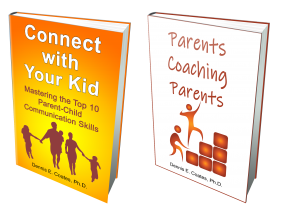So many of the emotional flare-ups and conflicts that arise between parent and child are triggered by the failure to communicate effectively. Instead, we react emotionally, with frustration or anger. It’s only natural, but it alienates your child. It’s an old story.
The problem is, while love is the foundation for effective communication, love is not enough, and practically no one acquires these skills in youth, before you have children.
As a parent, you can learn to express empathy, listen to understand, give encouraging feedback, guide your child to think for themselves, resolve conflict, and engage in dialogue.
But learning what the skills involve is only the beginning. In the heat of the moment, the skill has to be your automatic response. You can do the work to wire your brain for the skill, if you repeat it enough. It’s like golf or any other skillset: reading a book or watching a video is a good start. But you have to follow through with practice, practice, and more practice.
And like acquiring any skill, the process of ingraining it has its ups and downs, its successes and disappointments. So it can sometimes be discouraging, which can make it hard to stay the course.
I’ve learned that it helps a great deal to have a coach – another parent who is also working on the skills to partner with you to coach each other. It helps so much to be held accountable, to have someone who will listen to your frustrations and encourage you. This is why I wrote the book, Parents Coaching Parents, a brief guide for parents who want to support each other this way. Think of it as a companion book to Connect with Your Kid: Mastering the Top 10 Parent-Child Communication Skills. The two books are best used as coaching references as you work on one skill at a time.
When talking about listening and the other skills I often use the word “magical.” But knowing what to do isn’t the same as actually doing it. You gotta get your reps.
The child you love so much is worth making the effort.


